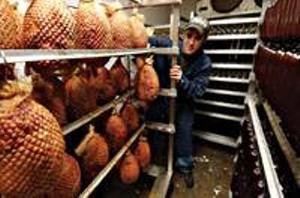Published July 18, 2007 at 8:35 p.m.
Sausage-making is not a pretty process. But at Vermont Smoke & Cure, the pork slinks out of a grinder in hot-pink strands that even a vegan might find sexy. The magenta sausage dangling from nearby racks enhances the surprisingly sensual ambience of this small-scale meat factory behind a Shell station in South Barre.
Two white-coated workers are busily chopping on a recent morning, while a third employee scrubs the stainless-steel surfaces. Production proceeds briskly at Vermont Smoke & Cure even though it's the company's "slow season." Hogs are typically slaughtered six months after birth. Because "farmers don't want to deal with litters of pigs in the dead of winter," says VSC General Manager Chris Bailey, there's a temporary shortage of raw material.
That hasn't stopped the company's sales — $340,000 in 2005 to $640,000 in 2006, and a projected $1 million-plus this year. Shaw's and Hannaford now carry the brand, and VSC products are served to customers at Nectar's, American Flatbread and several other Vermont Fresh Network restaurants. Fans of the Vermont Mountaineers baseball team or the American Basketball Association champions Vermont Frost Heaves can chomp on VSC's hot and sweet sausages while cheering for the home team in Montpelier, Burlington or Barre.
A bigger breakthrough is on the way. Balducci's and the Food Emporium, two gourmet supermarkets in Manhattan, are set to begin selling VSC products. The New York Times ushered the small company into the Big Apple by referring to VSC's bacon as "possibly the finest . . . on the planet."
Vermont Smoke & Cure has been ramping up its production to meet the swelling demand. The company recently purchased a new packaging machine that not only operates many times faster than its aged predecessor, but also makes the meat appear more appetizing. "We got turned down from a couple of places because the bacon packaging looked kind of sloppy," Bailey says, patting the new machine as though it were a thoroughbred racehorse.
"We want to be number one in the Northeast," adds Bailey, a former farmer in Montpelier, Charlotte and Maine who has an undergraduate degree from Dartmouth and an MBA from Cornell. VSC will have to surpass McKenzie's Country Classics to snag that title in Vermont. But, as Bailey points out, McKenzie — a subsidiary of Massachusetts-based Kayem Foods, Inc. — "doesn't have much presence in Vermont except for sales."
VSC has plenty of "authentic Vermont" credibility. It's owned by the Farmers Diner, a pioneering proponent of the localvore ethic. Tod Murphy, the diner's founder, says he bought VSC in 2001 just as it was about to go out of business after almost 40 years of production in central Vermont. The proprietors of the adjacent Shell station are former owners of the old smoking operation. Murphy's immediate motive was to line up a supplier of bacon and sausage for the Farmers Diner, which was then just about to open. But he says he also "wanted to begin to learn the obstacles to working with farmers and local sourcing."
And learn he has.
He's learned that Vermont doesn't produce enough pork to supply the operation. The firm's primary product offering derives almost exclusively from hog farmers outside Vermont. In fact, Vermont Smoke & Cure will buy about 300,000 pounds of pork from Québec this year, Bailey estimates. The imports are unavoidable, he says, because Vermont can't come close to meeting VSC's needs, even though the company offers to pay what's typically double the commodity price for pigs raised in-state. A few Vermont hog farmers have begun doing business with VSC, but the quantity of pork drawn from these sources remains tiny.
"There's no tradition of this kind of farming in Vermont," Bailey observes. Murphy adds that, while a few Vermont farmers have begun to raise hogs, "they have a direct-to-customer market that allows them to receive gourmet retail pricing that we cannot approach."
The underlying problem, Murphy continues, is "the complete loss of infrastructure — slaughterhouses, processing facilities, auction houses, trucking, etcetera." Apart from the manufacture of artisan cheeses and the growing of vegetables for sale at farmers' markets, agriculture is dying or struggling in Vermont, Murphy says.
Steve Justis, a development specialist with the Vermont Agency of Agriculture, agrees that VSC won't be able to obtain sufficient supplies of local meat, including pork, until related services are put in place. "We have a strong infrastructure for dairy, but little else," Justis says. He notes that most culled dairy cattle, which produce lean ground beef, are shipped to Pennsylvania for processing. "We need a stronger commitment from the state of Vermont and/or UVM for extension personnel if we're ever to develop these industries."
There are economic benefits, too, in landing local suppliers. Products with the word "Vermont" on their labels tend to fetch higher prices because consumers scarf them up. "The Vermont brand is just incredibly valuable," Murphy says. "Delis want it on labels. They don't even care what the product is."
That explains why the company's Vermont Maple Breakfast, Sweet Italian and Hot Italian sausages can be found under two different labels: The Vermont Smoke & Cure line capitalizes on the Vermont cachet; the Farmers Diner variety, which contains a higher percentage of local meat, sells better in health-food stores and co-ops.
They all make the most of maple, however, which is integral to the "flavor profile" of many VSC products, Bailey points out. The company's ham, bacon and some of its sausage are brined with syrup from the Sweet Retreat sugarbush in Northfield.
Plus, the company's smoker is fueled by maple wood and corn cob because that combination produces "a sweeter smoke" than the hickory and apple wood used by many makers of premium bacon, Bailey says. The 50-year-old, Kansas City-made smoker is slightly larger than a telephone booth and has a single small, blurry window. "We try to have the maple flavor come through. You'd know the difference in taste immediately if you put our bacon side by side with theirs."
Seeking to add substance to its wholesome image, VSC is working toward an "all-natural" product line. Almost all its meat now is preservative-free, Bailey notes, adding that the company plans to stop buying pork raised by farmers who administer antibiotics.
The company is also developing what Bailey calls "super-niche artisanal products." One of the first offerings could be air-dried sausage, which he says has a nutty flavor. The company is also testing a curing process based on celery juice. The vegetable extract is naturally low in nitrates but still effective in curing because it "allows bacteria to do its thing," Bailey explains.
If VSC continues growing at its current rate, the company will soon have to move to a larger facility. Prospecting has begun — but only in Barre. "We want to stay here," says Bailey, who lives in town. "The transportation is good, the workforce is here, and there's a long local tradition of smoking and curing."
Outside regular business hours, VSC helps carry on that legacy by processing meats from some 500 central Vermont farmers who raise just enough to feed their families and a few neighbors. This connection to local sustenance stands as "one big reason why the Farmers Diner bought Vermont Smoke & Cure," says Bailey, who also serves as the diner's controller and marketing director.
The relationship between the two entities is coming to an end, however. Vermont Smoke & Cure will soon become independent, because, Murphy explains, "it's a separate and complex business that requires complete attention to managing it without tweezing out its operation and financial issues from those associated with the diner." Now based in Quechee, the Farmers Diner will continue to be one of VSC's major customers.
One of the Farmers Diner's investors, Cathy Berry of New Hampshire, "has basically bought Vermont Smoke & Cure," Bailey observes. After the "spin out in process," he predicts, cross-ownership will stand at around 5 percent.
No matter how much VSC prospers, it can't afford to get too big, however. Tim Benzing is a chef instructor and charcuterie specialist at the New England Culinary Institute's Inn at Essex. Taste is everything in the specialty food business, he cautions, and the taste quality of smoked meats diminishes in inverse proportion to the volume of sales.
Although he's not familiar with VSC's products, Benzing's approach to smoking and curing is similar in both technique and scale. "What we produce is moist and succulent. It's handmade and thus vastly superior to what you'll get from Oscar Mayer." Those are the qualities that will make sophisticated Manhattanites reach for VSC sausage or bacon — assuming the company can ride the wave of its success without losing its small-scale appeal.
Info:
More By This Author
Speaking of Food
-

Q&A: Howard Fisher Delivers Meals on Wheels With a Side of Good Cheer
Dec 20, 2023 -

Video: Howard Fisher Delivers Meals on Wheels
Dec 14, 2023 -

Q&A: Alexis Dexter Rescued 57 Shelter Cats During the July Flood
Sep 13, 2023 -

Video: Two Months After the Flood, Alexis Dexter Rebuilds Kitty Korner Café in Barre and Continues to Rescue Cats
Sep 7, 2023 -

Video: Saying Goodbye to Burlington’s Penny Cluse Café
Nov 17, 2022 - More »
Comments
Comments are closed.
From 2014-2020, Seven Days allowed readers to comment on all stories posted on our website. While we've appreciated the suggestions and insights, right now Seven Days is prioritizing our core mission — producing high-quality, responsible local journalism — over moderating online debates between readers.
To criticize, correct or praise our reporting, please send us a letter to the editor or send us a tip. We’ll check it out and report the results.
Online comments may return when we have better tech tools for managing them. Thanks for reading.















































